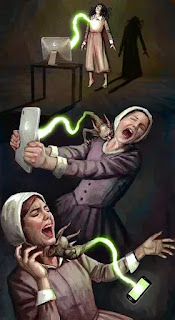I was brought up with the so-called "traditional publishing" that went by the same rules with all the publishing houses I worked with: One wrote a script, had it accepted, signed a contract, had a sum for one's script, and then waited for the day the book was published. It went like clockwork, in an orderly manner: Both the author and the publishers knew what was expected of them and did what was necessary, also when it came to PR. This process of this kind of publishing held some not-so-pleasant possibilities of e.g. rejections, (severe) criticism, rewrites, etc. because it was based on co-operations with the staff of the publishers. Or put another way: One may have ideas, but some of them may be rejected by what actually becomes one's boss, namely the publisher. On the other hand, look on some of the bright sides of traditional publishing: One's book may become noticed by "The literary world", one may even win prizes and gain fame as what is called a "Serious or Genuine Writer". Also one may earn more money as books which were published by reputable publishers enter the shelves of bookstores, may be turned into a movie, etc., etc.. However, there is a drawback as it seems that one can't get into traditional publishing without an agent ....
Self-publishing offers some traits that's very alluring to the writer who likes to work on his/her own: He or she decides the plot, the cover, etc. with no interference from a publisher. However, the literary world as such doesn't hold self-published authors in high esteem. Also, these books tend not to sell very well, no matter what literary qualities they may hold. As it is, with time this special way of publishing has sort of split up into a kind of hybrid of traditional publishing, which in a way pretends to be self-publishing: "Vanity Presses". They are run by special publishing houses which somehow have gained hold of writers who, more or less, have to do the work of what used to be done by traditional publishers. Not only do they have to toil with e.g. PR, but they also have to pay to get their books out. Actually, they may have to pay for the entire process without any guarantee of earnings. Right now there are quite a lot of these "Vanity Presses" which succeed in bleeding writers where they should be the ones who paid them. Obviously, this is not the best of times for writers, beset by "leeches" as they are, but what other ways of publishing are there? As far as I can see writers don't have other choices at the moment, but I'm sure that sooner or later they shall find some as they have to in order to keep doing what they want to do: To write ....


.jpg)



















